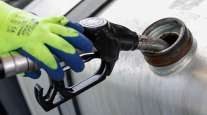Heavy-Duty Engine Manufacturers Allow Biodiesel Use Without Voiding Warranties
By Frederick Kiel, Staff Reporter
This story appears in the April 23 print edition of Transport Topics. Click here to subscribe today.
Acknowledging the growing popularity of vegetable-based biofuels, most heavy-duty engine makers have switched their policies to authorize biodiesel mixtures of at least 5% in their engines.
 Most manufacturers said that using biodiesel blends they approve would not affect engine warranties, although they did say that if the fuel caused an engine breakdown, warranties would not cover it.
Most manufacturers said that using biodiesel blends they approve would not affect engine warranties, although they did say that if the fuel caused an engine breakdown, warranties would not cover it.
Cummins Inc., Caterpillar Inc., Volvo Trucks North America, Mack Trucks Inc. and Detroit Diesel Corp. all said customers could safely use some level of biodiesel.
The engine makers’ policies indicate a sharp change from recent positions. For example, Caterpillar warned three years ago that “use of more than 5% biodiesel fuel can cause premature failures. The repair for these failures would not be covered under the Caterpillar warranty.”
Cummins announced March 21 that it would raise the approved biodiesel percentage to 20%, both in its older engines and in its 2007 models.
“We have completed exhaustive analysis and test evaluations, which enable Cummins to provide the necessary guidance and information to our customers for the proper and successful use of this fuel in our engine,” said Edward Lyford-Pike, chief engineer, advanced alternative fuel programs. “This will enable our customers to have a choice that includes renewable fuel.”
Cummins said the approval of B20 included its 2002 and later emissions-compliant ISX, ISM, ISL, ISC and ISB engines as well as 2007 engines, and several ratings of off-highway and marine engines.
“We believe that Cummins decision will encourage other engine makers to raise the levels of their biodiesel standard to at least 20%,” Amber Thurlo Pearson, spokeswoman for the National Biodiesel Board, told Transport Topics.
“We feel that B20 [20% biodiesel, 80% regular diesel] is viable in every diesel engine,” Pearson said. “B20 offers a seamless transition to biofuel and has an all-year-long weather capability when it is blended correctly.”
Pearson said that the board’s goal “for growth in the industry is 5 by 2015. What that means is by 2015, we foresee displacing up to 5% of the on-road diesel fuel [with biodiesel].”
Caterpillar said April 16 that it now permits blends of up to 30% biodiesel for use in its pre-2007 engines. The statement said that Caterpillar has not yet decided on biodiesel use for its 2007 engines but expects to issue guidelines later this year.
Volvo and Mack said they would authorize B5 blends and DDC said it has allowed blends up to B20 since 2004.
“Volvo Trucks North America engine warranties cover up to a B5 blend on the Volvo D11, D13 and D16 engines for 2007,” Volvo spokesman Jim McNamara told Transport Topics. “The same limit applies to the pre-2007 Volvo D12.”
“Mack Trucks has authorized its warranty for B5 fuel for its 2007 heavy duty MP7 and MP8 engines,” spokesman John Walsh told TT. Walsh said the authorization also applied to Mack’s pre-’07 engines.
Both spokesmen said that neither Volvo nor Mack had ever rejected a warranty claim for an engine because it ran on biodiesel.
Detroit Diesel Corp. said in a 2004 statement that blends of up to B20 could be used in its engines, but it did not recommend a larger percentage than B5. DDC representatives de-clined to comment whether the engine maker, owned by Freightliner LLC, has updated its policy.
“Biodiesel meeting the D6751 specifications can be blended up to 20% maximum by volume in diesel fuel,” Detroit Diesel said. “Failures attributed to the use of biodiesel will not be covered by product warranty.”
Roy Wiley, spokesman for International Truck and Engine Corp., said the firm has not yet reached any conclusion on biodiesel in its new MaxxForce engines, “because we won’t be building them until next year.”
Paccar Corp., parent company of Kenworth Truck Co. and Peterbilt Motors Co., declined comment but has said it will begin building a heavy-duty engine in the United States in 2009.
Louis Wenzler, on-highway market communications director for Cummins, told TT that, though “the use of biodiesel does not affect Cummins warranties, it is important that any fuel meets industry standards.”
“If you have fuel, and it has water in it, that water could cause the injector to freeze up and fail, and then the warranty would not apply. If biodiesel is made to standards, it does not have water in it,” Wenzler said.
The National Biodiesel Board agreed with that viewpoint.
“Since engine manufacturers warranty the materials and workmanship of their engines, they do not warranty fuel of any kind,” the board said in a statement.
“If there are engine problems caused by a fuel (again, whether that fuel is petrodiesel fuel or biodiesel fuel), these problems are not related to the materials or workmanship of the engine but are the responsibility of the fuel supplier and not the engine manufacturer,” the board said.
In North America, most bio-diesel comes from soybeans, while Europeans depend upon rapeseed oil. Research continues worldwide to develop alternate sources, some of which may produce many times the number of gallons that soy or rapeseed provide.




